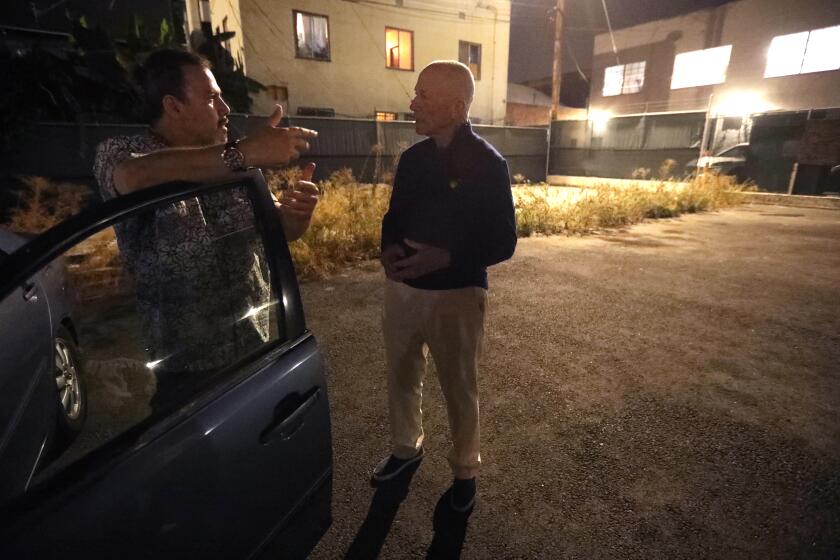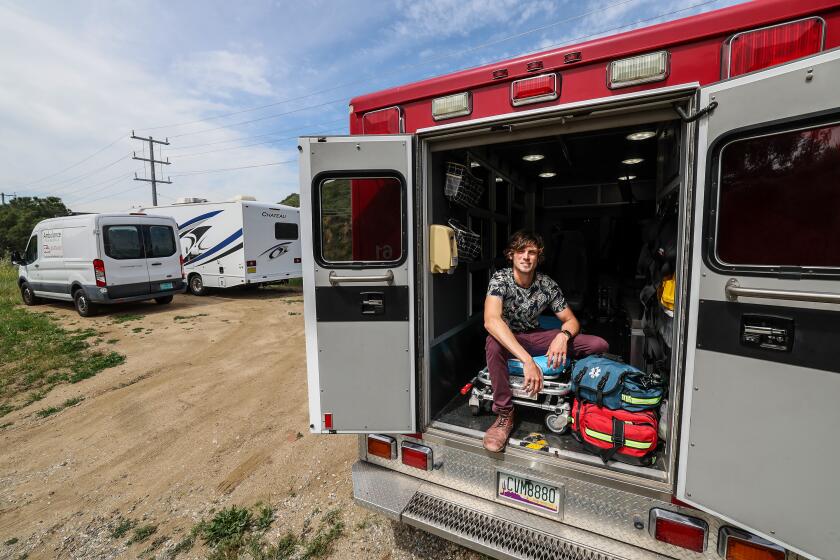Northridge Girl Goes to Washington, Puts President on Hot Seat
ROSE GARDEN GRILLING: Jennifer Steinberg, a Northridge fifth-grader, found herself in an unlikely situation during a recent vacation trip to Washington: confronting President Clinton with a question on national television.
Not only that, she asked him about a pervasive problem rarely discussed in the presidential campaign or by the President since his election.
Jennifer, 11, her parents and younger brother were approached by a producer for “CBS This Morning” while standing in line to tour the White House. The producer asked if they wanted to join 216 others the next day in the Rose Garden. There, Jennifer became one of 25 participants to query Clinton.
“I’ve been visiting Washington, D.C., and I’ve noticed a lot of homeless people on the streets and it really made me sad . . .” Jennifer said. “And I was just wondering if you had any plans to help them find jobs and get homes.”
Clinton responded that he jogs past about six homeless people every morning. “It’s a very complicated problem,” he said, noting that some homeless prefer the streets to shelters they regard as unsafe. “It’s a question of jobs, of education, of drug treatment often.”
The President said that Housing Secretary Henry G. Cisneros is heading an Interagency Council on the Homeless that is to develop a coordinated plan to get people off the streets. “He didn’t really answer the question,” Jennifer said, assessing Clinton’s response with the critical eye of a capital insider. “But he did a good job of explaining it. He made me feel a little better about it.”
In any case, she said it “was a lifetime experience. Nothing like that will ever happen to me again.” Big brother Sean, 14, was not so fortunate. He returned home after three days in Washington and regretted missing the Rose Garden rendezvous. Said Jennifer: “He found it was going to be an educational trip so he might as well be in school.”
*
BIG BUCKS: Freshman Rep. Howard P. (Buck) McKeon (R-Santa Clarita), who owns a chain of western clothing stores with his four younger brothers, took a pay cut when he ran for Congress virtually full-time last year.
But he still managed to make do on a salary of $329,000. On his annual financial statement, McKeon claims assets of $435,000 to $1.378 million, in addition to stock in Howard & Phil’s Western Wear valued at more than $1 million (some assets and the stock are held jointly).
He has liabilities of $165,000 to $400,000. Since his election, McKeon has had to further scale back his role in the clothing business under House rules. “I had to resign as a member of the board and as an officer in the company and had to reduce my salary significantly,” McKeon said. “The only thing that I will be doing is consulting.”
House members receive a salary of $133,600 a year. After 28 years building the business into 53 stores, McKeon said, “I just made that kind of money in the last few years.” Still, when he went to the corporate office to pay some personal bills on his computer earlier this year, he found that rank doesn’t always have its privileges. “They had taken the phone out of my office,” he said. “Someone else needed it and I was never there.”
*
... AND MORE BUCKS: McKeon ended his election campaign--which included a rough and costly Republican primary--with a debt of $201,000. Much of it was money McKeon himself has loaned the campaign. Since his election, he has held one fund-raiser in Washington, largely for special-interest political action committees, and another recently in Studio City, primarily for constituents and local supporters. He grossed $72,000 at the $250-a-person event on June 10, which was attended by 280 supporters. Past and possibly future Republican presidential candidate Jack Kemp was the featured speaker. But McKeon is an equal-opportunity fund-raiser. At a $100-a-plate event planned for the Antelope Valley in mid-September, former Defense Secretary Dick Cheney, another potential GOP White House aspirant in 1996, will be the draw.
*
FRAYED ALLIANCE: Reps. Henry A. Waxman (D-Los Angeles) and Howard L. Berman (D-Panorama City) went their own ways in the recent Los Angeles mayoral race--a further signal of a new aloofness in their political relationship.
Waxman enthusiastically endorsed Democratic City Councilman Michael Woo following the April primary; Berman sat it out despite being courted by both Woo and Republican Richard Riordan.
“I wanted to be able to work with whoever won and each of them had their strengths and weaknesses,” Berman said.
Waxman and Berman, longtime political partners, have grown more distant following the drubbing of their associate Mel Levine in the Democratic U.S. Senate primary last June. Still, this was not the first time that the lawmakers have not joined forces on a big race.
Berman and Levine endorsed Dianne Feinstein in the 1990 Democratic gubernatorial primary over a past ally, then-Atty. Gen. John Van de Kamp; Waxman remained neutral. But on the high-stakes mayoral race they proceeded without so much as consulting each other.
“I made a decision for myself,” Waxman said. This week both Waxman and Berman joined Riordan at a lunch and Capitol Hill news conference when the mayor-elect visited Washington. “We’ve got to work together,” Waxman exhorted.
*
PURSUING PEROTISTAS: Rep. Anthony C. Beilenson (D-Woodland Hills) held a two-hour town hall meeting in Thousand Oaks with members of Ross Perot’s organization primarily from the Thousand Oaks area. Nearly 300 individuals attended--about 80% of whom were from the United We Stand chapter in Beilenson’s suburban 24th District.
The focus of the session, which was held at the initiative of local United We Stand leaders, was the heart of Perot’s agenda: deficit reduction, campaign finance reform and the proposed North American Free Trade Agreement. Beilenson chided Perot for being less specific recently about his own deficit-cutting plans even as he blasted President Clinton’s plan at every turn.
“He’s really served a useful purpose in educating people and suggesting they should look hard at this subject matter and, in many ways, these people are more serious themselves in a responsible and constructive way than Mr. Perot himself has been in recent months,” said Beilenson, a strong advocate of deficit reduction who voted for Clinton’s budget.
The lawmaker also took issue with the group on NAFTA, which he is inclined to support pending additional labor and environmental agreements. Perot is adamantly opposed to the pact, as were most of those at the town hall meeting.
Beilenson, who is likely to seek the backing of the Perot loyalists in 1994, praised the session. He said it “revved me up.” Verne Bauman, the coordinator of the Conejo Valley chapter of United We Stand America, also described the extended exchange as positive.
But he was more circumspect about the Perot loyalists’ reaction to Beilenson. “I think people for the most part were not impressed with many of his policies when he came to the meeting and I think they left with the same opinion,” said Bauman. “I don’t think many minds were changed but some understanding was gained.”



